As a minister in the previous military-proxy U Thein Sein administration, U Soe Thane once fooled the world into thinking that Myanmar had reached a watershed moment, touting the end of the country’s decade-long military dictatorship and presenting an image of a government that was reform-minded on every front.
He attended the Davos economic forum. Whenever he met international executives and political leaders at home or abroad who were doubtful of the country’s sudden opening up in 2011, he assuaged their doubts, insisting that Myanmar was changing and asking for their help. To convince the skeptical, the former admiral offered international guarantees that “the comprehensive reform initiatives undertaken to achieve democratization” in his country were “irreversible.”
A member of the former junta that ceded power to U Thein Sein in early 2011, he developed an image as a reformist minister taking steps to help Myanmar reengage with the world as part of the political, economic and social reforms launched by general-turned-president U Thein Sein. Historian Thant Myint-U, who served as an adviser to that administration, called him the “principle architect of the normalization of ties with the West” in his latest book, The Hidden History of Burma.
The mask slipped 10 years later, however, when U Soe Thane finally showed his true colors by wholeheartedly supporting the Myanmar military’s latest coup early this year. On Feb. 1, the military (or Tatmadaw) seized power from the country’s democratically elected government led by Daw Aung San Suu Kyi’s National League for Democracy (NLD), which had assumed power from the U Thein Sein administration after a landslide electoral victory in 2015. The putsch not only ended the country’s democratic interlude after less than a decade, but also plunged Myanmar into social and political turmoil. More than 1,300 people have been killed so far by the regime, mostly for their anti-junta activism.
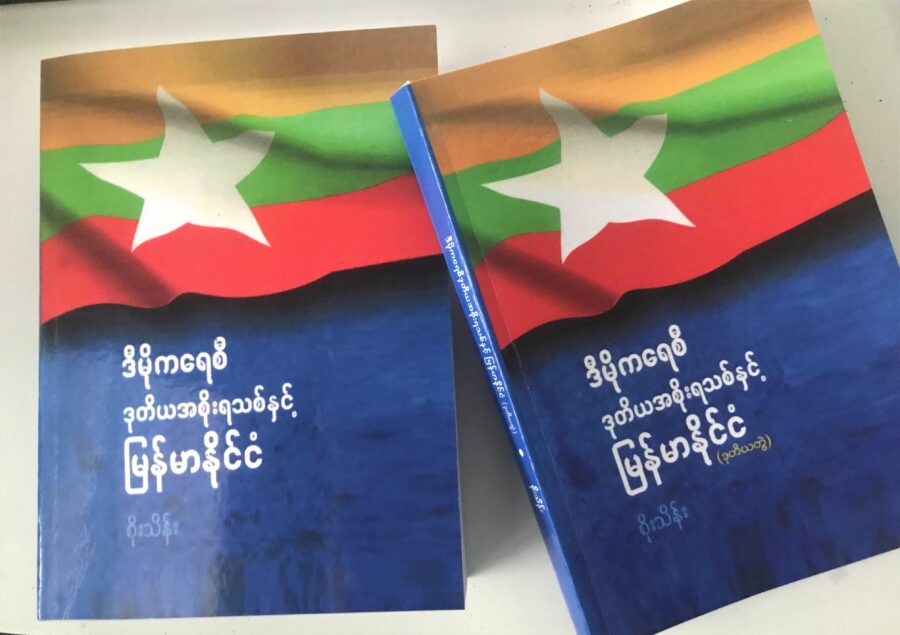
The old soldier’s revelation appeared in his latest book, The Second Democratic Government and Myanmar, referring to the term of the NLD government under Daw Aung San Suu Kyi from 2016 to 2020. For unknown reasons, the two-volume book in Burmese is not publicly available. According to a copy viewed by The Irrawaddy, the first volume was published in October 2020 and the second in August 2021—seven months after the takeover.
‘Independence was restored on Feb. 1, 2021’
In the second volume, the author praises coup leader Senior General Min Aung Hlaing’s seizure of power from the NLD as “a very smart move.” Recalling the fateful day when Myanmar was again shrouded under the cloak of military dictatorship, the former admiral can’t hide his elation at the takeover. He writes: “Our Myanmar’s independence was restored on Feb. 1, 2021.” For those who were once convinced by his talk of irreversible democratization and reform, there is a clear lesson to be learned from the remark: Whenever someone with ties to Myanmar’s military preaches democracy or reforms, they are lying.
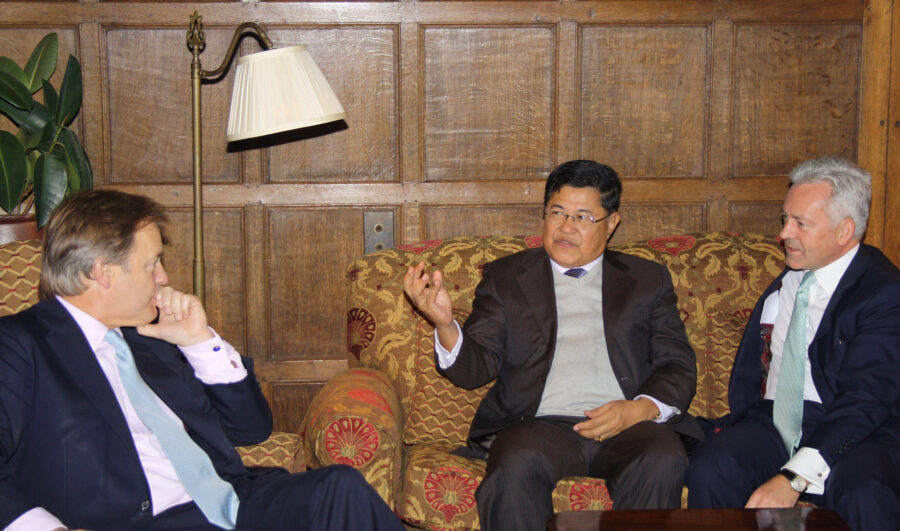
As the title suggests, U Soe Thane’s latest book is about the NLD government of Daw Aung San Suu Kyi. The second volume largely focuses on controversies surrounding both the campaign period and the days following the 2020 general election, in which the NLD won another landslide victory. The military justified its coup by accusing the NLD of misusing power while in government and orchestrating vote fraud during the election; the author echoes these claims by Min Aung Hlaing.
U Soe Thane was named industry minister in U Thein Sein’s cabinet when the latter took office in 2011 and was widely viewed as corrupt. Later he was appointed as one of the President’s Office ministers and economic czar, and became, “Burma’s main cheerleader abroad, speaking frankly but optimistically about the country’s prospect” as Thant Myint-U puts it in his latest book.
In 2016, when U Thein Sein’s government was succeeded by the NLD administration in the wake of the military-proxy Union Solidarity and Development Party (USDP)’s election defeat the previous year, U Soe Thane became an opposition lawmaker, affording him the opportunity to assess the NLD government’s performance. For this reason, if he had chosen to offer an objective, fact-based analysis, his account of this period could have been of great interest. Indeed, in his preface the author says the book is aimed at future historians, scholars and anyone who is interested in Myanmar politics, with “no ulterior motives”.
But the book turns out to be nothing more than an effort to disparage the NLD government and praise the U Thein Sein administration for its achievements, while making personal attacks on Daw Aung San Suu Kyi and stoking nationalism by claiming that Buddhism in Myanmar was under threat during the NLD’s rule.
It’s true that the NLD government had some flaws, and there were some positive national developments during U Thein Sein’s tenure. But readers shouldn’t be misled: when the former general launched his reforms in 2011, he had nearly all the nation’s resources at his disposal. The ministries were largely led by former military men, and the leadership of their departments had already been packed with ex-servicemen. More importantly, the military was on his side.
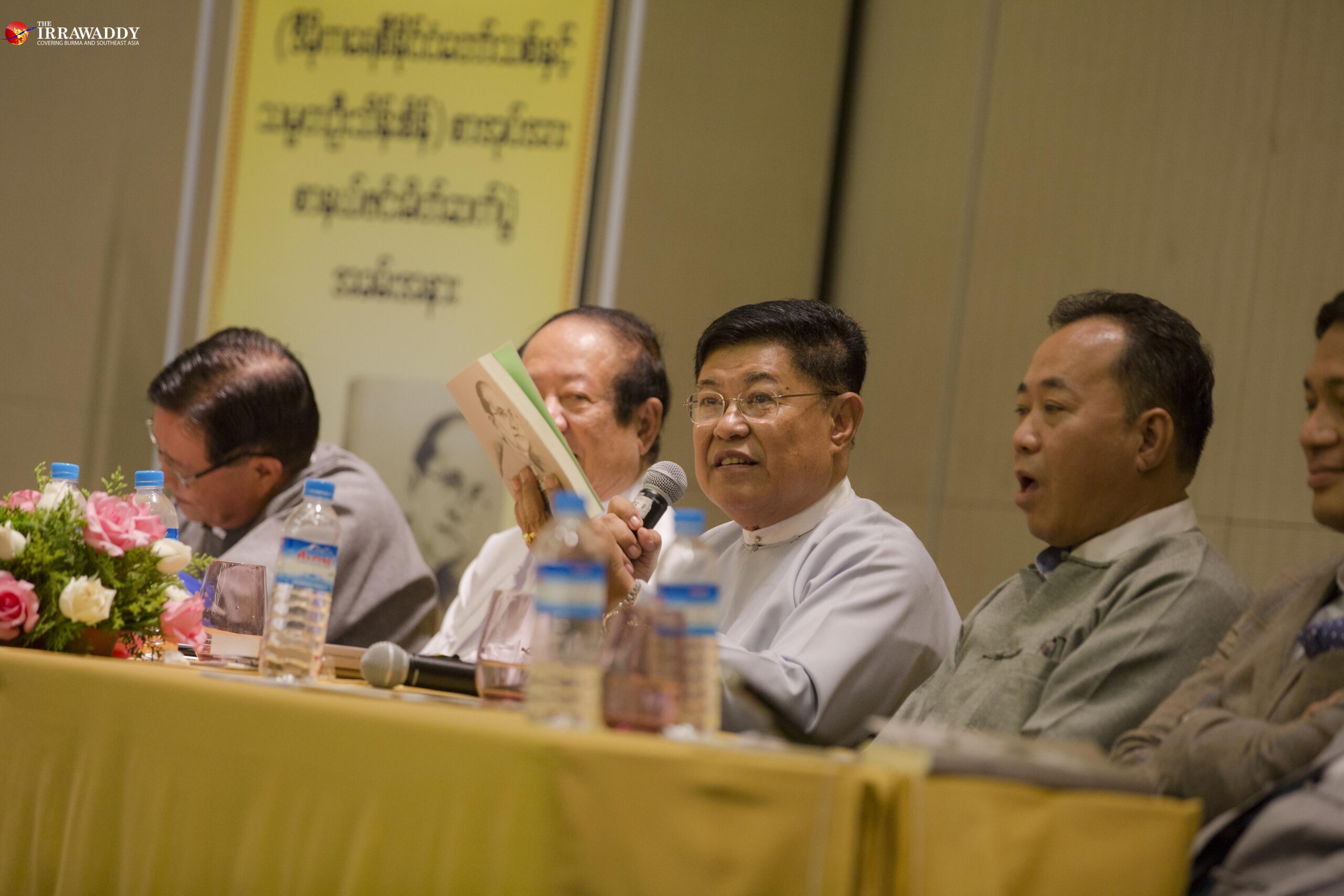
When the NLD took over in March 2016, all Daw Aung San Suu Kyi had to work with was the people who had supported her up to that point, and a group of freshly appointed cabinet members. It’s an open secret that implementation of some NLD government policies was hampered by permanent secretaries and top officials appointed by the previous government, who remained resistant to change. Then-NLD secretariat member U Win Htein said in 2017: “They are like old horses trained by the previous people. We are the new jockeys riding old horses, trying very hard to take them in the direction we want. It’s annoying.” Of course, you won’t learn this from U Soe Thane’s book; he is only interested in praising his ex-boss U Thein Sein while glossing over the tainted legacy he left behind. Anyone who has read U Soe Thane’s 2018 book Myanmar’s Transition & U Thein Sein: An Insider’s Account knows this proclivity well.
Living by the old regime’s playbook
Another big disappointment for readers is that the book is teeming with passages copied and pasted from reports and Facebook posts written by NLD opponents, nationalists and military sympathizers, which the author relies on heavily to support his claims and smear the NLD and Daw Aung San Suu Kyi. Some of these posts were evidently a factor in the military’s decision to stage the coup, containing claims that the NLD planned to try the military leadership before judges from the International Criminal Court in Naypyitaw after forming the new government on Feb. 1, with messages such as: “36 top generals from the military, including former dictator Than Shwe, will be sentenced to death!”
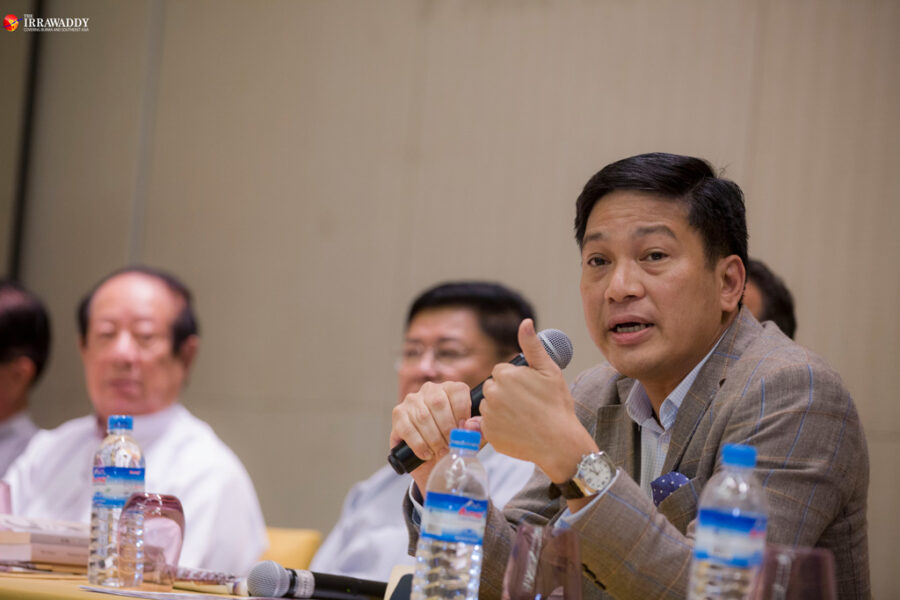
At one point, U Soe Thane claims Daw Aung San Suu Kyi sent a letter to Wakar Uddin, director general of the Arakan Rohingya Union, a group working to protect the rights of Rohingya Muslims in Myanmar. As published in the book, in the undated letter, she asks, in her capacity as a Lower House candidate for the Kawhmu Township constituency and the NLD leader, for the Rohingya activist’s support for her party. According to U Soe Thane, she told the activist that if the NLD won, it would “enact a new law that would heavily punish any Myanmar people, under religious and racial hate crime laws, who discriminated against Rohingya people.”
The letter purportedly continues: “To change Myanmar in that way, our NLD has to win the election. The party is seriously in need of assistance from foreigners who want change in Myanmar. That’s why I need your help as well….”
It’s clear that the author intentionally published such unsubstantiated information to drive a wedge between Daw Aung San Suu Kyi and her supporters at home, as the Rohingya issue is a simmering one in Myanmar. Furthermore, U Soe Thane seeks to portray Daw Aung San Suu Kyi as an untrustworthy figure who cultivates foreigners to advance her own interests. If that was indeed the author’s aim, suffice it to say that he should be more creative next time, because it’s a well-worn tactic—one the previous regime used repeatedly starting in 1988 to delude the public. Unfortunately, it has never worked; her electoral victories in 1990, 2012, 2015 and 2020 are evidence of the unwavering popular support she enjoys to this day.
However, there are some people who buy such unfounded information. Enter U Thein Nyunt and Mahn Nyein Maung—an NLD renegade and an U Thein Sein apologist, respectively. Now the duo are both devotees of coup leader Min Aung Hlaing and members of the regime’s governing State Administration Council (SAC).
In their forewords to the book, these junta proponents express shock at the author’s unsupported “revelation” of Daw Aung San Suu Kyi’s correspondence on the Rohingya issue. U Thein Nyunt writes: “I couldn’t believe my eyes to learn about the steps taken by the group, so disloyal to the country they would sell it for their own interests,” while Mahn Nyein Maung describes the alleged letter as “an insult to the state and the people,” before adding “our people still fail to see her true character.” Unsurprisingly, these birds of a feather sing from the same hymn sheet.
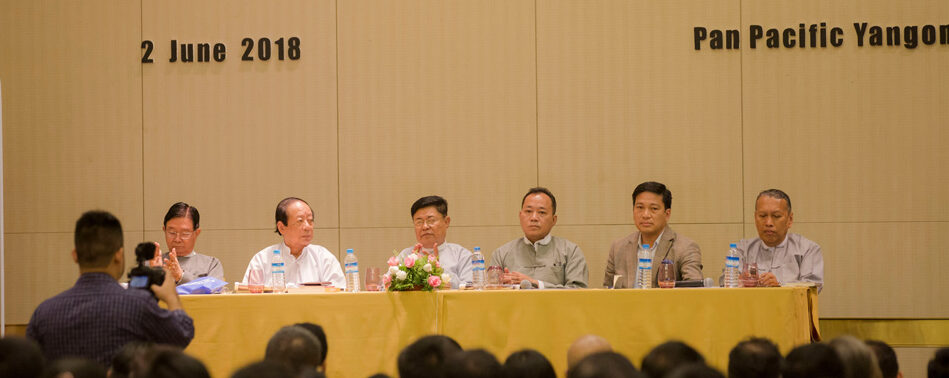
While U Soe Thane badmouths the NLD government and Daw Aung San Suu Kyi in his book, he carefully avoids saying anything that could be viewed as a direct call for a coup in the first volume, which he finished writing in April 2020. Instead, he devotes a whole chapter in the first volume to painstakingly listing every tension between the NLD lawmakers and military representatives in Parliament. These range from the naming of a vice president to the creation of the State Counselor position for Daw Aung San Suu Kyi to the NLD’s efforts to amend the constitution. The Tatmadaw’s representatives in Parliament complained that these moves were unconstitutional: a red line for the military, which regards itself as the guardian of the constitution. As evidence for his claims that the NLD government breached the constitution and the public was unhappy with its performance, he relies on pro-military, anti-Suu Kyi and anti-NLD social media posts.
However, in the second volume, which he started writing after the coup, the former admiral, who was once dubbed a reformer, no longer attempts to hide the fact that he had longed for military intervention “since a few days after the NLD took office.” In April 2016, when the NLD named a vice president and submitted the State Counselor Law, creating Daw Aung San Suu Kyi’s position, to the Parliament, the military complained that both breached the charter. The NLD prevailed, however, thanks to its parliamentary majority.
On both occasions, U Soe Thane writes in the second volume, “The military should have taken the opportunity to make things right, as the constitution had been violated,” before adding, “Most of us [in the opposition] couldn’t tolerate it [the enactment of the State Counselor Law], wishing the military would set the country in the right direction.”
“Make things right” and “set the country in the right direction”? The Myanmar people, who have lived under successive military rulers, fully understand these seemingly innocuous statements. They are nothing but military euphemisms for “stage a coup.”
All in all, just as a leopard can’t change its spots, U Soe Thane’s The Second Democratic Government and Myanmar is a testament to the fact that he has always been a supporter of military dictatorship at heart, despite the veneer of a reform-minded minister he adopted 10 years ago. The book is essentially a confession by the 73-year-old author—who, after all, was once a member of Myanmar’s previous military junta under Than Shwe—that he retains that regime’s mindset, choosing to ignore the election result and believing that only the military can “pull the country back from the abyss.” Reading it should provoke considerable shame in those supporters who once hailed him as a reformer.
Worst of all, he heartily praises Min Aung Hlaing’s takeover, which led to an ongoing bloodbath that has taken more than 1,300 lives so far. If the coup leader is guilty of the crime, U Soe Thane is his accomplice. His book provides ample evidence for all to see.
You may also like these stories:
Book’s Snapshots of Two Young Lives Illuminate Myanmar’s Political, Social Ills
US Sanctions on Myanmar Put International Banks in the Spotlight
In Myanmar, Pro-Junta Vigilante Groups Wage Campaign of Violence, Disinformation

















